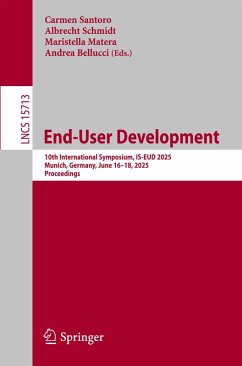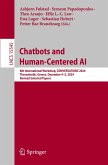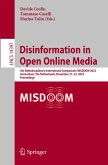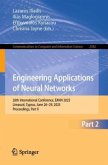End-User Development
10th International Symposium, IS-EUD 2025, Munich, Germany, June 16-18, 2025, Proceedings
Herausgegeben:Santoro, Carmen; Schmidt, Albrecht; Matera, Maristella; Bellucci, Andrea
End-User Development
10th International Symposium, IS-EUD 2025, Munich, Germany, June 16-18, 2025, Proceedings
Herausgegeben:Santoro, Carmen; Schmidt, Albrecht; Matera, Maristella; Bellucci, Andrea
- Broschiertes Buch
- Merkliste
- Auf die Merkliste
- Bewerten Bewerten
- Teilen
- Produkt teilen
- Produkterinnerung
- Produkterinnerung
This book constitutes the refereed proceedings of the 10th International Symposium on End-User Development, IS-EUD 2025, held in Munich, Germany, during June 16 18, 2025.
The 13 full papers and 8 short papers included in this book were carefully reviewed and selected from 25 submissions. These papers have been organized under the following topical sections: Automation, Sustainability, and Smart Environments; Democratizing AI and Programming; AI for End-User Empowerment: Personalization andWellbeing; and EUD Principles, Methodologies, and Participatory Cultures.
Andere Kunden interessierten sich auch für
![Chatbots and Human-Centered AI Chatbots and Human-Centered AI]() Chatbots and Human-Centered AI83,99 €
Chatbots and Human-Centered AI83,99 €![Disinformation in Open Online Media Disinformation in Open Online Media]() Disinformation in Open Online Media38,99 €
Disinformation in Open Online Media38,99 €![Digital Forensics and Cyber Crime Digital Forensics and Cyber Crime]() Digital Forensics and Cyber Crime46,99 €
Digital Forensics and Cyber Crime46,99 €![Digital Forensics and Cyber Crime Digital Forensics and Cyber Crime]() Digital Forensics and Cyber Crime69,99 €
Digital Forensics and Cyber Crime69,99 €![Prompting Causal Events Prompting Causal Events]() Jordi VallverdúPrompting Causal Events34,99 €
Jordi VallverdúPrompting Causal Events34,99 €![Advanced Computing and Communications: Responsible AI Advanced Computing and Communications: Responsible AI]() Advanced Computing and Communications: Responsible AI113,99 €
Advanced Computing and Communications: Responsible AI113,99 €![Engineering Applications of Neural Networks Engineering Applications of Neural Networks]() Engineering Applications of Neural Networks68,99 €
Engineering Applications of Neural Networks68,99 €-
-
-
This book constitutes the refereed proceedings of the 10th International Symposium on End-User Development, IS-EUD 2025, held in Munich, Germany, during June 16 18, 2025.
The 13 full papers and 8 short papers included in this book were carefully reviewed and selected from 25 submissions. These papers have been organized under the following topical sections: Automation, Sustainability, and Smart Environments; Democratizing AI and Programming; AI for End-User Empowerment: Personalization andWellbeing; and EUD Principles, Methodologies, and Participatory Cultures.
The 13 full papers and 8 short papers included in this book were carefully reviewed and selected from 25 submissions. These papers have been organized under the following topical sections: Automation, Sustainability, and Smart Environments; Democratizing AI and Programming; AI for End-User Empowerment: Personalization andWellbeing; and EUD Principles, Methodologies, and Participatory Cultures.
Produktdetails
- Produktdetails
- Lecture Notes in Computer Science 15713
- Verlag: Springer / Springer Nature Switzerland / Springer, Berlin
- Artikelnr. des Verlages: 978-3-031-95451-1
- Seitenzahl: 368
- Erscheinungstermin: 13. Juni 2025
- Englisch
- Abmessung: 235mm x 155mm x 20mm
- Gewicht: 558g
- ISBN-13: 9783031954511
- ISBN-10: 3031954513
- Artikelnr.: 74155733
- Herstellerkennzeichnung
- Springer-Verlag GmbH
- Tiergartenstr. 17
- 69121 Heidelberg
- ProductSafety@springernature.com
- Lecture Notes in Computer Science 15713
- Verlag: Springer / Springer Nature Switzerland / Springer, Berlin
- Artikelnr. des Verlages: 978-3-031-95451-1
- Seitenzahl: 368
- Erscheinungstermin: 13. Juni 2025
- Englisch
- Abmessung: 235mm x 155mm x 20mm
- Gewicht: 558g
- ISBN-13: 9783031954511
- ISBN-10: 3031954513
- Artikelnr.: 74155733
- Herstellerkennzeichnung
- Springer-Verlag GmbH
- Tiergartenstr. 17
- 69121 Heidelberg
- ProductSafety@springernature.com
.- Automation, Sustainability, and Smart Environments.
.- An EUD Approach to Creating Feasible and Energy-saving Automations for Smart Homes.
.- End-User Customization of Trigger-Action Rules through Fine-Tuned LLMs.
.- Explaining Problems in Daily Automations with ExplainTAP.
.- Conversational Rule Creation in XR: User s Strategies in VR and AR Automation.
.- From User Needs to Smart Ecosystems through LLMs: the Smartifier Case Study.
.- Assembly Workers as PLC Programmers: What End Users Need to Understand about Low-Code Development Platforms.
.- Democratizing AI and Programming.
.- Fostering Novice Collaboration in ML-Based System Design Through Visual Languages and Touch Interfaces.
.- Visual and Textual Language Synchronization for End-User Programming Environments.
.- OMNI: an EUD tool for Ontological Multisensory Navigation Interface.
.- Explanation-Driven Interventions for Artificial Intelligence Model Customization: Empowering End-Users to Tailor Black-Box AI in Rhinocytology.
.- Evaluating Visual Prompting Modalities for Generative AI-Assisted UI Design.
.- AI for End-User Empowerment: Personalization andWellbeing.
.- Beyond Usability: IntroducingWellbeing-Driven End-User Development Design.
.- AI-Assisted Cognitive Support for Caregivers: A RAG and EUD Framework for Geriatric Care.
.- From Digital Self-Control Apps to iOS Shortcuts: Enabling Privacy-Centric Wellbeing Research Without Code.
.- Empowering End Users to Design for Their Digital Self-Control.
.- Leveraging EUD and Generative AI for Ethical Phishing Campaigns.
.- Classifying User Motivation in Interactions.
.- EUD Principles, Methodologies, and Participatory Cultures.
.- Mindsets, Cultures, and Technologies in Support of End-User Development.
.- Assessing Computational Thinking Skills through Artefacts: the Case of ModeLLer.
.- Scenario-Based Design Tools: End-User Reflections to Requirements.
.- Defining Classes and Semantic Relationships from User Scenarios through a Heuristic Approach.
.- An EUD Approach to Creating Feasible and Energy-saving Automations for Smart Homes.
.- End-User Customization of Trigger-Action Rules through Fine-Tuned LLMs.
.- Explaining Problems in Daily Automations with ExplainTAP.
.- Conversational Rule Creation in XR: User s Strategies in VR and AR Automation.
.- From User Needs to Smart Ecosystems through LLMs: the Smartifier Case Study.
.- Assembly Workers as PLC Programmers: What End Users Need to Understand about Low-Code Development Platforms.
.- Democratizing AI and Programming.
.- Fostering Novice Collaboration in ML-Based System Design Through Visual Languages and Touch Interfaces.
.- Visual and Textual Language Synchronization for End-User Programming Environments.
.- OMNI: an EUD tool for Ontological Multisensory Navigation Interface.
.- Explanation-Driven Interventions for Artificial Intelligence Model Customization: Empowering End-Users to Tailor Black-Box AI in Rhinocytology.
.- Evaluating Visual Prompting Modalities for Generative AI-Assisted UI Design.
.- AI for End-User Empowerment: Personalization andWellbeing.
.- Beyond Usability: IntroducingWellbeing-Driven End-User Development Design.
.- AI-Assisted Cognitive Support for Caregivers: A RAG and EUD Framework for Geriatric Care.
.- From Digital Self-Control Apps to iOS Shortcuts: Enabling Privacy-Centric Wellbeing Research Without Code.
.- Empowering End Users to Design for Their Digital Self-Control.
.- Leveraging EUD and Generative AI for Ethical Phishing Campaigns.
.- Classifying User Motivation in Interactions.
.- EUD Principles, Methodologies, and Participatory Cultures.
.- Mindsets, Cultures, and Technologies in Support of End-User Development.
.- Assessing Computational Thinking Skills through Artefacts: the Case of ModeLLer.
.- Scenario-Based Design Tools: End-User Reflections to Requirements.
.- Defining Classes and Semantic Relationships from User Scenarios through a Heuristic Approach.
.- Automation, Sustainability, and Smart Environments.
.- An EUD Approach to Creating Feasible and Energy-saving Automations for Smart Homes.
.- End-User Customization of Trigger-Action Rules through Fine-Tuned LLMs.
.- Explaining Problems in Daily Automations with ExplainTAP.
.- Conversational Rule Creation in XR: User s Strategies in VR and AR Automation.
.- From User Needs to Smart Ecosystems through LLMs: the Smartifier Case Study.
.- Assembly Workers as PLC Programmers: What End Users Need to Understand about Low-Code Development Platforms.
.- Democratizing AI and Programming.
.- Fostering Novice Collaboration in ML-Based System Design Through Visual Languages and Touch Interfaces.
.- Visual and Textual Language Synchronization for End-User Programming Environments.
.- OMNI: an EUD tool for Ontological Multisensory Navigation Interface.
.- Explanation-Driven Interventions for Artificial Intelligence Model Customization: Empowering End-Users to Tailor Black-Box AI in Rhinocytology.
.- Evaluating Visual Prompting Modalities for Generative AI-Assisted UI Design.
.- AI for End-User Empowerment: Personalization andWellbeing.
.- Beyond Usability: IntroducingWellbeing-Driven End-User Development Design.
.- AI-Assisted Cognitive Support for Caregivers: A RAG and EUD Framework for Geriatric Care.
.- From Digital Self-Control Apps to iOS Shortcuts: Enabling Privacy-Centric Wellbeing Research Without Code.
.- Empowering End Users to Design for Their Digital Self-Control.
.- Leveraging EUD and Generative AI for Ethical Phishing Campaigns.
.- Classifying User Motivation in Interactions.
.- EUD Principles, Methodologies, and Participatory Cultures.
.- Mindsets, Cultures, and Technologies in Support of End-User Development.
.- Assessing Computational Thinking Skills through Artefacts: the Case of ModeLLer.
.- Scenario-Based Design Tools: End-User Reflections to Requirements.
.- Defining Classes and Semantic Relationships from User Scenarios through a Heuristic Approach.
.- An EUD Approach to Creating Feasible and Energy-saving Automations for Smart Homes.
.- End-User Customization of Trigger-Action Rules through Fine-Tuned LLMs.
.- Explaining Problems in Daily Automations with ExplainTAP.
.- Conversational Rule Creation in XR: User s Strategies in VR and AR Automation.
.- From User Needs to Smart Ecosystems through LLMs: the Smartifier Case Study.
.- Assembly Workers as PLC Programmers: What End Users Need to Understand about Low-Code Development Platforms.
.- Democratizing AI and Programming.
.- Fostering Novice Collaboration in ML-Based System Design Through Visual Languages and Touch Interfaces.
.- Visual and Textual Language Synchronization for End-User Programming Environments.
.- OMNI: an EUD tool for Ontological Multisensory Navigation Interface.
.- Explanation-Driven Interventions for Artificial Intelligence Model Customization: Empowering End-Users to Tailor Black-Box AI in Rhinocytology.
.- Evaluating Visual Prompting Modalities for Generative AI-Assisted UI Design.
.- AI for End-User Empowerment: Personalization andWellbeing.
.- Beyond Usability: IntroducingWellbeing-Driven End-User Development Design.
.- AI-Assisted Cognitive Support for Caregivers: A RAG and EUD Framework for Geriatric Care.
.- From Digital Self-Control Apps to iOS Shortcuts: Enabling Privacy-Centric Wellbeing Research Without Code.
.- Empowering End Users to Design for Their Digital Self-Control.
.- Leveraging EUD and Generative AI for Ethical Phishing Campaigns.
.- Classifying User Motivation in Interactions.
.- EUD Principles, Methodologies, and Participatory Cultures.
.- Mindsets, Cultures, and Technologies in Support of End-User Development.
.- Assessing Computational Thinking Skills through Artefacts: the Case of ModeLLer.
.- Scenario-Based Design Tools: End-User Reflections to Requirements.
.- Defining Classes and Semantic Relationships from User Scenarios through a Heuristic Approach.








